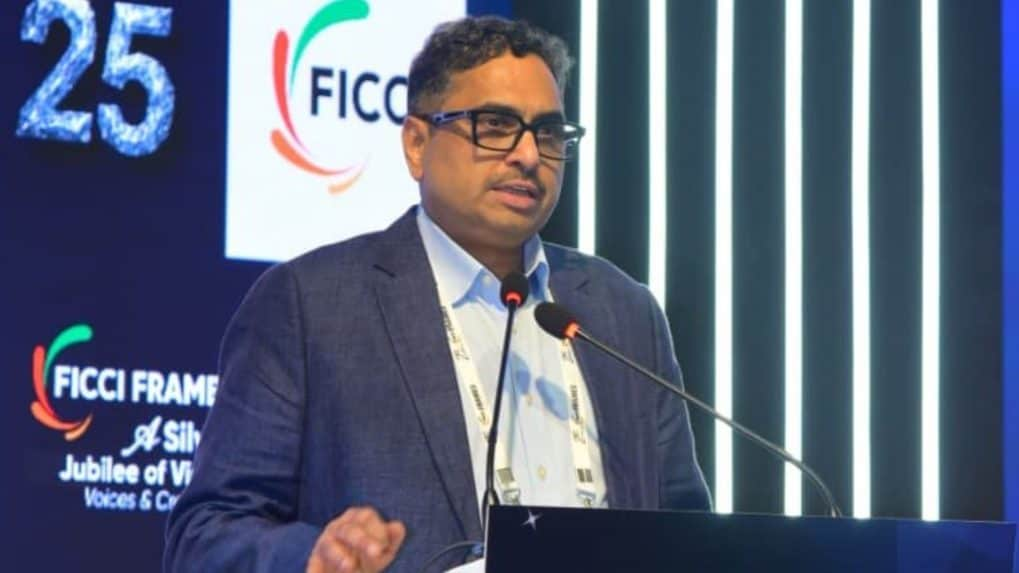Advertising
From Pink Slips to Silent Sidelining: Inside adland’s layoff and anxiety crisis

India’s creative economy stands at a “pivotal crossroads,” where growth must go hand in hand with accountability, said Sanjay Jaju, Secretary, Ministry of Information & Broadcasting (I&B), during his keynote address at FICCI Frames 2025, on October 7.
Emphasising that freedom of expression lies at the heart of India’s democracy, Jaju cautioned that the fundamental right enshrined in Article 19(1) must not be eroded by the spread of misinformation and fake content. “The fundamental right of expression is at the heart of our Constitution, and it’s important that it does not get eroded because of people monetizing content through clickbait and fake material,” he said.
His comments come soon after the Karnataka High Court in India rejected X's (formerly Twitter's) petition challenging the government's "Sahyog" portal, which facilitates online content removal and is part of the IT Act, upholding the government's authority to regulate online speech. X Corp intends to appeal, arguing the portal allows unchecked censorship and violates the rights to free expression of its users and the platform itself. The court, however, affirms that freedom of speech under India's constitution is subject to reasonable restrictions and cannot be used to justify "unregulated speech" or "lawlessness".
Read more: Centre's safe harbour framework 'Sahyog' becoming a censorship apparatus? Experts weigh in
During the event, Jaju also underscored the serious national and economic risks posed by piracy, describing it as a challenge that goes beyond creative theft. “Pirated material has implications for national security and money laundering. Much of it comes from offshore accounts,” he warned. The Ministry, he added, has formed working groups with the Motion Picture Association and the Producers Guild of India, and is developing an application to curb the circulation of pirated content.
“Intellectual property lies at the core of any creative process, and it’s important that the content creator can monetize the value of their work,” Jaju stressed. “Piracy deserves equal attention as we build a responsible creative ecosystem.”
Calling this moment the “next golden age of creativity,” Jaju said India must now aim to become the world’s production hub for films, animation, gaming, and immersive media. He pointed to the growing potential of AI, 5G direct-to-mobile, and international co-productions, urging Indian filmmakers to craft stories that resonate globally. “We might think we have a great story, but that story must be international if it has to travel across the world,” he noted.
Highlighting government initiatives, Jaju said India’s Cine Hub is being expanded into a single-window digital platform for film and concert permissions, with a beta version set to go live by October-end to boost the concert economy. He also mentioned that the Indian Institute of Creative Technology (IICT) has begun operations in collaboration with FICCI, CII, and the Maharashtra government to upskill creative professionals and incubate startups in media and entertainment.
He lauded the success of the World Audiovisual and Entertainment Summit (WAVES), calling it a “movement” rather than a one-time event, with its next edition scheduled for 2027. The summit, he said, has helped strengthen India’s global creative outreach, with parallel events being hosted in Melbourne, Busan, and Toronto.
As part of the government’s broader reform agenda, Jaju revealed that the ministry is also working on broadcasting and DTH reforms, as well as measures to make India the “world’s most vibrant, ethical, and innovative creative economy.”
He closed with a call to the industry, investors, and creators: “Innovate fearlessly and tell stories that uplift. Believe in the promise of Indian creativity. Continue shaping India’s cultural narrative with courage and conscience.”
Read more: WAVES Bazaar enabled content deals worth Rs 1,300 cr: Sanjay Jaju reveals at IICT inauguration
“Let us frame the next quarter century of Indian media and entertainment together — one that is bold in creativity, fair in conduct, and global in impact,” Jaju concluded.
From purpose-driven work and narrative-rich brand films to AI-enabled ideas and creator-led collaborations, the awards reflect the full spectrum of modern creativity.
Read MoreLooking ahead to the close of 2025 and into 2026, Sorrell sees technology platforms as the clear winners. He described them as “nation states in their own right”, with market capitalisations that exceed the GDPs of many countries.